The Only Game in Town Blu-ray Movie
HomeThe Only Game in Town Blu-ray Movie 
Limited Edition to 3000 - SOLD OUTTwilight Time | 1970 | 113 min | Rated PG | Jun 11, 2013
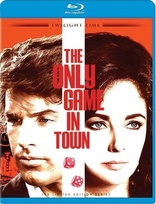
Movie rating
6.2 | / 10 |
Blu-ray rating
| Users | 3.5 | |
| Reviewer | 2.5 | |
| Overall | 3.2 |
Overview
The Only Game in Town (1970)
Fran walks into a piano bar for pizza. She comes back home with Joe, the piano player. Joe plans on winning $5,000 and leave Las Vegas. Fran waits for something else. Meanwhile, he moves in with her.
Starring: Elizabeth Taylor, Warren BeattyDirector: George Stevens (I)
| Romance | Uncertain |
| Drama | Uncertain |
| Comedy | Uncertain |
Specifications
Video
Video codec: MPEG-4 AVC
Video resolution: 1080p
Aspect ratio: 1.84:1
Original aspect ratio: 1.85:1
Audio
English: DTS-HD Master Audio Mono
Music: DTS-HD Master Audio 2.0
Subtitles
None
Discs
50GB Blu-ray Disc
Single disc (1 BD)
Playback
Region free
Review
Rating summary
| Movie | 2.0 | |
| Video | 4.0 | |
| Audio | 4.0 | |
| Extras | 1.5 | |
| Overall | 2.5 |
The Only Game in Town Blu-ray Movie Review
Can two losers make for a winning film?
Reviewed by Jeffrey Kauffman June 14, 2013Is there something in the air? I just waxed nostalgic about the fantastic William Goldman book The Season: A Candid Look at Broadway in my Reuben, Reuben Blu-ray review. In that book, the famed screenwriter profiled the incredibly disastrous 1967-68 season on Broadway, detailing the behind the scenes dramas afflicting just about every show that opened that year, including Spofford, the middling comedy that ultimately became Reuben, Reuben some fifteen years later. And now just a few days after that review went live, I’m awash in memories of The Season again, this time about The Only Game in Town, yet another middling comedy that Goldman dissects in his book and which didn’t take quite as long to make it to the screen (for better or worse, as it turns out), due largely to the fact that the play was written by Frank D. Gilroy, who had then recently become both a Tony and Pulitzer Prize winner for The Subject Was Roses, which became a rather successful film in 1968 and won a Best Supporting Actor Academy Award for Jack Albertson. In fact the film sale for The Only Game in Town happened before the show even opened on Broadway, and that seemed to really anger the New York critics, as if it removed them from the formula for dictating whether or not a show would be successful. And as it turned out, the rather humongous pre-sale of the property (to the then whopping tune of $500,000) made The Only Game in Town a success, on paper at least, even though it ran for only two weeks or so. Goldman had dealt with Spofford in a chapter called “Crap Game”, outlining how the vagaries of the critics (and we all know how critics can be) can tip the scales ever so slightly for shows that are largely unremarkable, either toward the “yay” column (as in the case of Spofford) or just as frequently, the “nay” column. The Only Game in Town is lumped in together with five other plays that opened that season in a chapter Goldman calls “Sex Comedy”. Goldman lays out the basic plots of all six plays, asking the reader to guess which two were successful. There are hints of Goldman’s piquant sense of humor here (every play has a character who is “wacky in his/her own way, but basically honest”), but there’s also some rather shocking homophobia in this chapter with regard to a flop called The 90 Day Mistress. Let’s just say that unless Goldman has considerably wised up in the intervening years, I don’t see him appearing at any GLAAD benefits anytime soon.
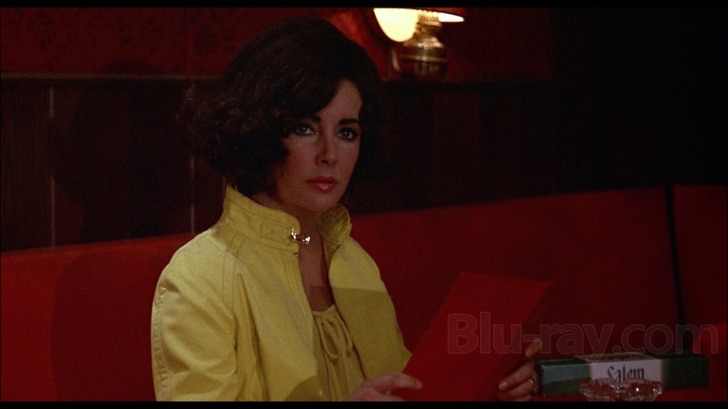
The first thing that viewers of The Only Game in Town might wonder, much as with Reuben, Reuben, is: “This is supposed to be a comedy?” Now, anyone who has seen Gilroy’s The Subject Was Roses knows that Gilroy was in no way, shape or manner a “Neil Simon” comedy writer, churning out perfect set ups and hilarious punch lines. But there was a wry, wistful humor to at least some of that piece, even if most of it played kind of like a slightly less intense version of Eugene O’Neill. (Ironically, The Subject Was Roses beat out Simon’s The Odd Couple for that year’s Tony Award for Best Play). But none other than William Goldman himself, certainly no slouch when it comes to comedic writing (as many of his screenplays prove), lists The Only Game in Town as a comedy, and a sex farce at that. He even goes on to say it was the best sex comedy of that ill fated season, one which was doomed only because critics resented the big pre-sale to the movies. That seems deliberately at odds with the kind of maudlin drama we’re presented in this film version, which not so coincidentally was adapted by Gilroy himself. In the case of Reuben, Reuben and Spofford, this disparity is at least partially understandable, since the film pretty radically reimagined the play, even to the point of focusing on a different character. But here with The Only Game in Town we have a play adapted to the screen by its own original author. What gives?
So leaving aside for a moment any highly debatable comedic element to this film, what are we left with? The play was for all intents and purposes a so-called “two hander”, and that aspect is carried through to the film version (there are in fact only four credited parts here). Elizabeth Taylor plays Las Vegas showgirl (yes, showgirl) Fran, who has been carrying on an unhappy affair with married man Lockwood (Charles Braswell). One night after a show (the cutting into close-up of Liz slightly moving her head to indicate dancing is perhaps the funniest thing in this film version), Fran drops by a little club to have a pizza and is soon entranced by Joe (Warren Beatty), the place’s lounge pianist (yes, lounge pianist). Now that set up may sound like incredibly ripe territory for outright hilarity, but this Game is played pretty much strictly for—well, I’m not sure, really, though it isn’t laughs.
Fran brings Joe home, again on a whim, but he doesn’t try to force her into bed. She’s confused. She asks him to carry her there. Segue to them in bed, lighting cigarettes, and you know what that means. It turns out that Joe is an inveterate gambler who keeps blowing his tip money at the crap tables, but he still wants to pursue a relationship with Fran. Fran on the other hand is hoping her married lover (who lives out of town) will ultimately divorce his wife and come rescue her from the drudgery of her Las Vegas showgirl’s life. And that’s about it, really, including what must have been a third act showdown when the married lover actually shows up and forces Fran to make a decision.
Rather incredibly, this was the last film of the legendary George Stevens, who had done so well with Liz on A Place in the Sun and Giant. But 1970 was not the 1950s, and Liz was no longer an ingénue. Gilroy’s whole thesis in The Only Game in Town seems to be a reactionary response to the whole “free love” movement, insisting that commitment is the only way for the downtrodden to make something out of their lives. But Stevens, while perhaps well suited to this idea, doesn’t quite know what to do with his cast. Taylor is badly out of her league here (the role should have gone to someone like Shirley MacLaine, who could have milked more of the pathos out of Fran’s desperation), and she’s certainly not the right age to play opposite Warren Beatty (some reports indicate Frank Sinatra was originally cast in this role, and he at least would have been a bit more age appropriate for Taylor). What we have, then, is a kind of smarmy escapade between a “cougar” (long before that term had ever been coined) and a gigolo, leaving the audience without anyone to really root for.
What we’re left with is a pretty turgid melodrama with some flashes of brilliance (albeit awfully dated brilliance) in some of Gilroy’s pointed dialogue. And there is a lot of dialogue in this film, endless little two-fers that let Fran or Joe pontificate on the modern world or their burgeoning relationship. Stevens tries to open up what must have been a one or two set play by getting Joe into the Vegas clubs for some betting sequences (and there is what appears to be some second unit work with both Beatty and Taylor walking the Las Vegas Strip), but it’s largely for naught. This is a pretty claustrophobic piece, and my hunch is few people are going to want to be locked in a dowdy apartment with either of these folks.
The Only Game in Town Blu-ray Movie, Video Quality 
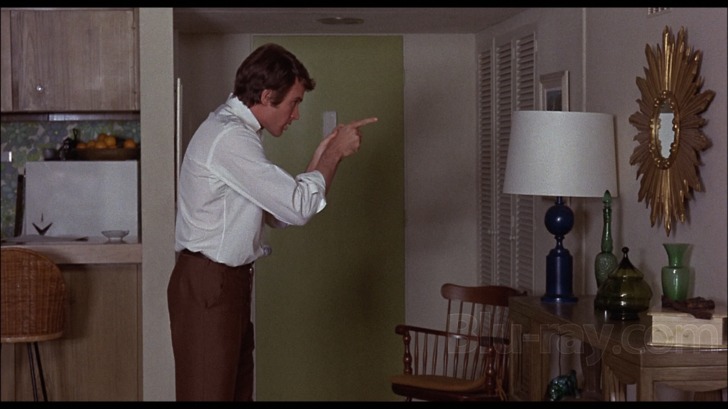
The Only Game in Town is presented on Blu-ray with an AVC encoded 1080p transfer in 1.84:1. This Fox master generally looks quite good, although it's rather surprisingly grainy at times. Colors are nicely saturated and quite vivid looking, though the increased resolution of this high definition presentation makes some of the rear projection pretty laughable (a scene at Lake Mead in a boat followed by a car ride are the worst examples). Liz is frequently shot in soft focus, especially in close-up, which may lead some to believe there are endemic problems in the transfer (a la the Breakfast at Tiffany's controversy). Overall, fine detail pops adequately, though this is not the sharpest looking Fox film we've seen from this label.
The Only Game in Town Blu-ray Movie, Audio Quality 
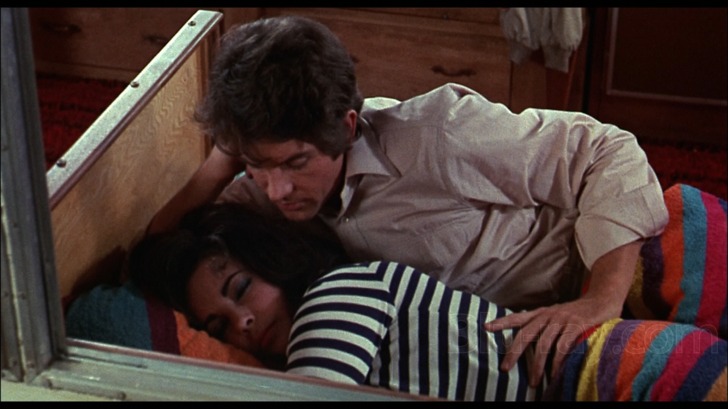
The Only Game in Town features a lossless DTS-HD Master Audio Mono mix which very capably supports this very dialogue heavy film. The vast bulk of the film is nothing other than Taylor and Beatty talking—and talking, and talking. Maurice Jarre's bombastic score also sounds fine. The mix is very well prioritized, even in the couple of pretty noisy gambling sequences.
The Only Game in Town Blu-ray Movie, Special Features and Extras 
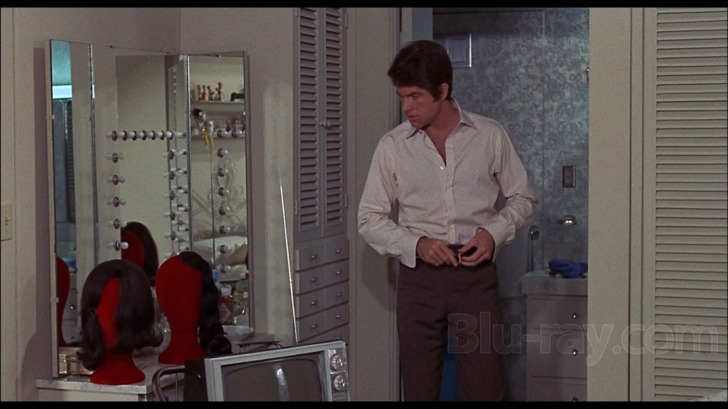
- Original Theatrical Trailer (480p; 2:55)
- Isolated Score. I'm on record with the heretical statement that I often find Maurice Jarre's scores to be anachronistic, but in this case, he does rather well, and with some unusual choices, to boot. This is Jarre in Vegas swingin' mode, with boisterous brass cues and some funky electric bass. The DTS-HD Master Audio 2.0 mix of the score opens things up a bit from its mono presentation on the actual soundtrack.
The Only Game in Town Blu-ray Movie, Overall Score and Recommendation 
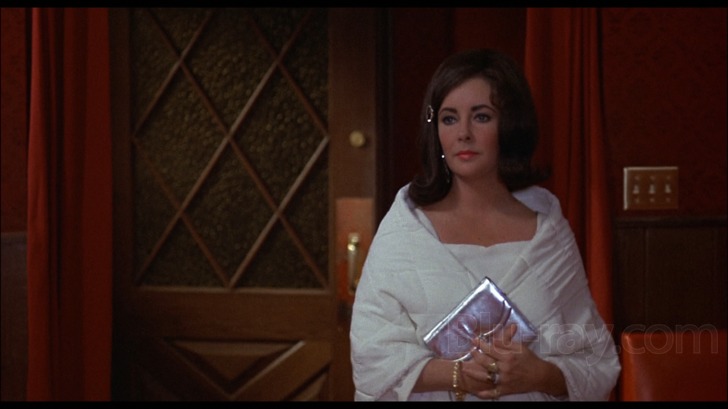
Much like the play, the film version of The Only Game in Town bombed—big time. And it's not hard to see why. The two leads are miscast, or least miscast with each other, and George Stevens simply doesn't seem to know how to shape the material. What we have is two people talking each other to death, and then deciding to get married. (Doesn't that usually happen the other way around? And if my wife is reading this, I'm kidding.) Fans of Beatty and Taylor may want to check this out, as the Blu-ray offers nice video and audio.
Similar titles
Similar titles you might also like

My Blueberry Nights
2007

You're a Big Boy Now
Warner Archive Collection
1966

New York, I Love You
2009

The Misfits
1961

Grand Hotel
1932

Third Person
2013

No Man of Her Own
1932

Indecent Proposal 4K
1993

Indiscretion of an American Wife
Terminal Station / Stazione Termini
1953

The Devil Is a Woman
1935

Gentlemen Prefer Blondes
1953

Midnight in Paris
2011

Vanity Fair
2004

Silver Linings Playbook
2012

Sabrina 4K
1954

Moonstruck
Award Series
1987

Tootsie
1982

Factotum
2005

Angel
1937

Last Night
2010